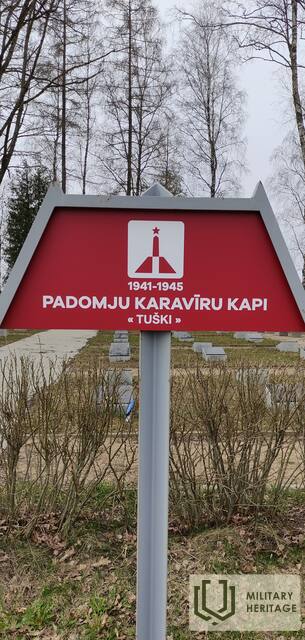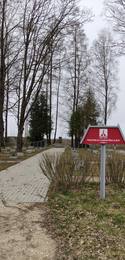Sovietų armijos kareivių ekshumacija Blīdenės parapijoje 2019 m.
2019 m. liepą kareivių paieškos grupė „Leģenda“ Blīdenės parapijos miške atkasė 66 kareivių pelenus. Dėl paviršutiniškumo ar nutylėjimo sovietmečiu dauguma šių kareivių laikomi oficialiai perlaidotais sovietmečiu. Šių kareivių vardai netgi išgraviruoti ant antkapių Tuškų brolių kapinėse.
2019 m. liepą kareivių paieškos būrys „Legenda“ rado ir ekshumavo 66 kareivių, kurie 74 metus gulėjo Blīdenės parapijos miške, pelenus, nors jų vardus galima perskaityti ant antkapių Tuškų kapinėse. Dėl aplaidumo ar neveiklumo, kuris buvo leidžiamas sovietmečiu, karo randas nebuvo atplėštas nė vienoje šeimoje.
Paieškos būrio vyrai dirbo toje vietovėje, kur Antrojo pasaulinio karo metu buvo Guļaucės girininko namas. Dabar tai miškas. Tačiau tuo metu čia buvo įkurtas Raudonosios armijos sanitarinis punktas, o žuvusieji buvo laidojami šalia jo, miško pakraštyje.
Rasti 308-osios Latvijos šaulių divizijos kareiviai. Apie 85 % jų buvo pašaukti į Raudonąją armiją iš Latvijos teritorijų 1944 m. pabaigoje. Tai daugiausia latviai. Ieškotojų laukė nemaloni staigmena. Manoma, kad dauguma šių kareivių oficialiai perlaidoti sovietiniais metais. Šių kareivių vardai netgi iškalti ant antkapių Tuškų brolių kapinėse.
„Tas pirmas sukrėtimas buvo nesuvokiamas. Nes žinojome, kad jis perlaidotas Tuškų kapinėse. Kasmet eidavome paminėti savo brolio“, – sako Ella Indzere, kare žuvusio Arvydo Popovo sesuo.
Ellos Indzeros ir Zidrytės Paulos vyresnysis brolis Arvīds Popovas negrįžo iš karo. Arvīds Popovas fronte išbuvo tik pusantro mėnesio.
„Tai buvo 1944 metų ruduo, kai Raudonoji armija įžengė į Latviją. Kuržemės katilas virė. Jie jau buvo atvykę iki Aucės“, – prisimena Ella.
„Jam buvo 19. Man buvo 17. Stovėjome prie vartų – tėtis, mama, aš. Mojavome. Jis atsigręžė, išėjo ir nebegrįžo. O tada kažkas iškvietė, kad nukrito“, – priduria Zidrīte Paula.
„Pamenu trečiąjį laišką, kurį pati perskaičiau po daugelio metų. Jis rašė: „Mamyte, karas greitai baigsis, ir aš iš Blīdenės grįšiu namo pėsčiomis.“ Šis sakinys man išliko labai artimas širdžiai. Išėjęs jis pakėlė mane, mergaitę, parodė šviesas ir pasakė – sesute, palauk manęs namuose“, – tęsia Ella.
Seserys saugo pageltusią žinutę su gedulinga žinia, kad jų brolis mirė nuo žaizdų 1945 m. kovo 5 d. fronte, pademonstruodamas vyriškumą ir didvyriškumą mūšyje su vokiečių užpuolikais. Nurodoma, kad jis buvo palaidotas 7-ajame kape miško pakraštyje, netoli Guļaucų namų Blīdenės rajone. Vėliau, sovietmečiu, šeimai buvo pranešta, kad Arvidas perlaidotas Tuškų brolių kapinėse.
https://www.sargs.lv/lv/otrais-pasaules-kars/2020-06-21/tusku-bralu-kapos-gulda-66-karaviru-pislus
https://www.lsm.lv/raksts/zinas/latvija/atrasti-66-kara-kritusi-karaviri-kuriem-bija-jadus-kapseta.a329053/
Susijusi laiko juosta
Susijusios vietos
Sovietinių kareivių kapinės „Tuški“
Raudonosios armijos 130-ojo Latvijos ir 8-ojo Estijos šaulių korpuso karių broliškos kapinės yra apie 350 metrų į pietvakarius nuo Blīdenės-Remtės kelio. Pavadinimas kilęs nuo Tuški ūkio, kuris buvo 400 m į pietus nuo kapinių.
1945 m. kovo 17 d. prasidėjo paskutinis Raudonosios armijos bandymas Kuržemėje. 308-oji Latvijos šaulių divizija puolė į pietvakarius ir vakarus nuo Tuškių sodybos ir per tris kovos dienas kirto Blīdenės-Remtės kelią aukštumų 142,2 rajone ir pasiekė Jaunāsmuižos-Mezmalių liniją. Mūšių metu žuvę kareiviai buvo palaidoti keliose mažose kapinėse netoli Ķėkių, Vērotojų, Jaunāsmuižos ir kitur.
Septintojo dešimtmečio pabaigoje, Sovietų Sąjungai pradėjus minėti Antrojo pasaulinio karo aukas, į šiaurę nuo Tuškų sodybos griuvėsių buvo įkurtos naujos kapinės, kuriose buvo planuojama perlaidoti visus Pilsblidenės ir Kaulačių apylinkėse žuvusius karius. Iš tikrųjų perlaidojimas buvo dalinis, nes labai dažnai žuvę kariai likdavo savo pirminėse kapavietėse, o Tuškų brolių kapinėse būdavo perrašomi tik jų vardai. Tuškų brolių kapinėse taip pat galima rasti 8-ojo Estijos šaulių korpuso karių, kurių pagrindinės karo laikų kapinės buvo dabartinių Pilsblidenės kapinių vietoje, vardus.
Taip pat yra paminklas Jakobui Kunderai, 8-ojo Estijos šaulių korpuso kareiviui, kuriam skirtas objektas „Kunderos taškai“. Iškart po mūšio Jakobas Kundera buvo palaidotas dabartinėse Pilsblidenės kapinėse, o vėliau perlaidotas Tuškų brolių kapinėse.






